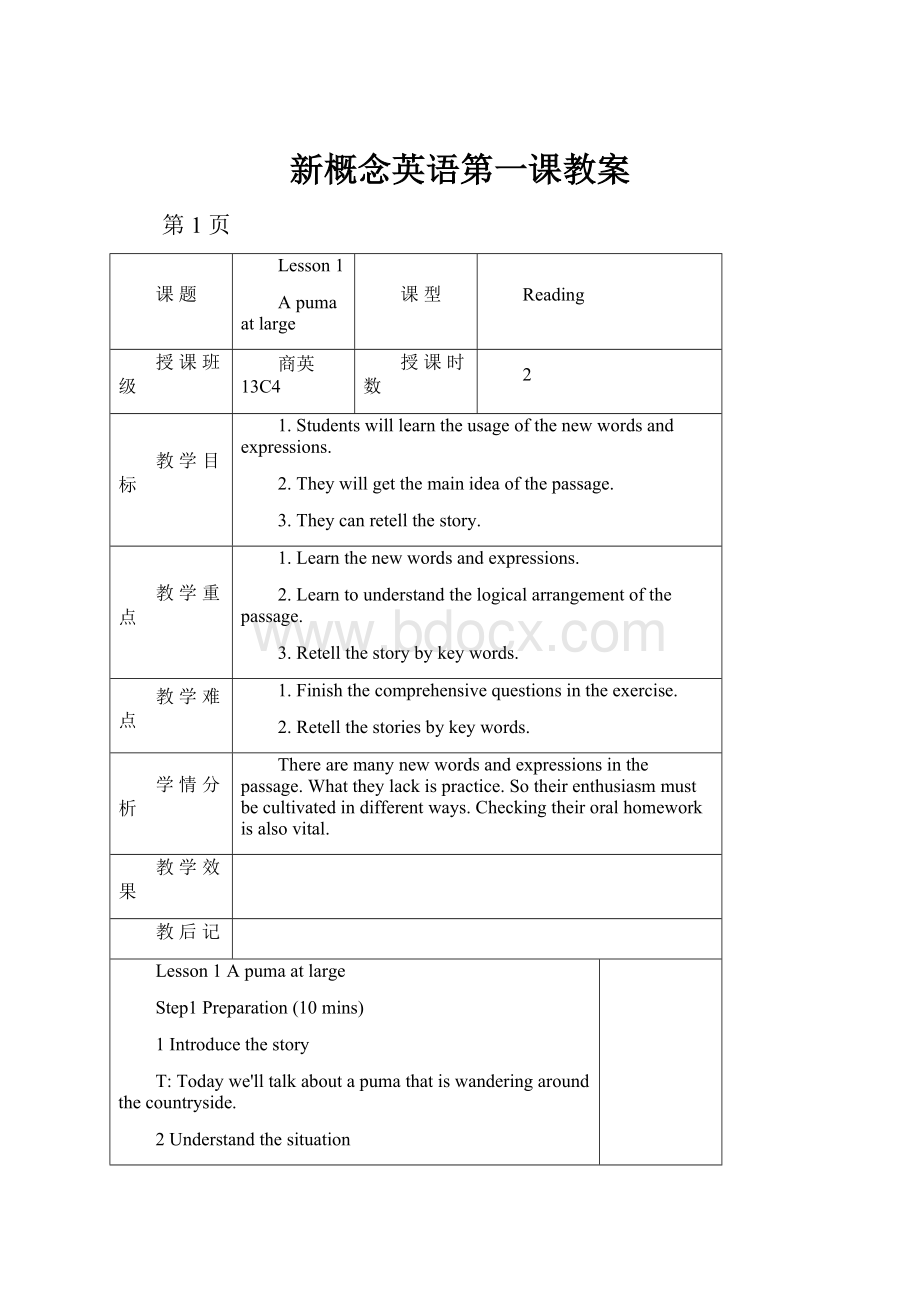新概念英语第一课教案.docx
《新概念英语第一课教案.docx》由会员分享,可在线阅读,更多相关《新概念英语第一课教案.docx(12页珍藏版)》请在冰豆网上搜索。

新概念英语第一课教案
第1页
课题
Lesson1
Apumaatlarge
课型
Reading
授课班级
商英13C4
授课时数
2
教学目标
1.Studentswilllearntheusageofthenewwordsandexpressions.
2.Theywillgetthemainideaofthepassage.
3.Theycanretellthestory.
教学重点
1.Learnthenewwordsandexpressions.
2.Learntounderstandthelogicalarrangementofthepassage.
3.Retellthestorybykeywords.
教学难点
1.Finishthecomprehensivequestionsintheexercise.
2.Retellthestoriesbykeywords.
学情分析
Therearemanynewwordsandexpressionsinthepassage.Whattheylackispractice.Sotheirenthusiasmmustbecultivatedindifferentways.Checkingtheiroralhomeworkisalsovital.
教学效果
教后记
Lesson1Apumaatlarge
Step1Preparation(10mins)
1Introducethestory
T:
Todaywe'lltalkaboutapumathatiswanderingaroundthecountryside.
2Understandthesituation
T:
Whatdoyouthinkishappeninginthepicture?
3Listeningobjective
T:
Listentothepassage(orreaditsilently)andseeifyoucananswerthisquestion:
Wheremustthepumahavecomefrom?
4Playthetapeorreadthestoryorwaitforthestudentstofinishreadingsilently
5Answerthequestion
Afterthereading,askthequestionagain:
Wheremustthepumahavecomefrom?
Trainthestudentsnottoshoutouttheanswer.Instead,ask
onestudent,thenasktheotherstoagreeordisagreewithashowofhands.
Answer:
Itmusthaveescapedfromaprivatecollection.
Step2Presentation(30mins)
1Intensivereading
Playthetapeorreadthetextagain,pausingaftereverysentencetocheckthestudentsunderstand.Obtainbriefexplanationstodifficultiesinthetextfromthestudentsthemselves.OnlyuseChineseifaconfirmatorytranslationisnecessary.
2Playthetapeorreadthestoryagain
3Comprehensionquestions
1Whatdopumaslooklike?
(Largecats.)
2Wherearetheyfound?
(InAmerica.)
3Wherehadawildpumabeenseen?
(Forty-fivemilessouthofLondon.)
4ThereportwasreceivedbyLondonZoo,wasn'tit?
(Yes,itwas.)
5WhydidtheZoofeelobligedtoinvestigate?
(Becausethedescriptionsgivenbypeopleweresimilar.)
6Wheredidthehuntforthepumabegin?
(Inasmallvillage.)
7Whatdidawomanclaimshehadseen?
(‘Alargecat’.)
8Whathadthewomanbeendoingatthetime?
(Pickingblackberries.)
9Onwhatoccasionswillapumaattackahuman?
(Whenitiscornered.)
10Didthesearchforthepumaprovedifficult?
(Yes,itdid.)
11Why?
(Becauseitwasoftenseenatoneplaceinthemorningandatanotherplaceintheevening.)
12Whatdidthepumaeat?
(Deerandsmallanimalslikerabbits.)
13Whatevidencewasfoundforthepuma'sexistence?
(Pawprintsandpumafur.)
14Whatsortsofnoisesdidpeoplecomplainabout?
(‘Cat-likenoises’.)
15Whendidabusinessmanseeapumaupatree?
(Whenhewasonafishingtrip.)
16Theexpertswerefullyconvincedofitsexistence,weren'tthey?
(Yes,theywere.)
Keywordsandexpressions
spotv.看出,发现
=see,pick out,recognize,catchsight of强调结果,辨别出,看见,识别,发现
--A tall man is easy to spot in the crowd.
--He has good eye for spotting mistakes.
同意词:
--find:
强调发现的结果/find out:
查出事实真相
--discover:
做出重大发现/notice:
注意到
--observe:
观察/watch:
观察活动中的人或画面
Spotn.斑点
--There is a white spot on the shirt.
on the spot有两个含义:
1>立刻,马上(at once,immediately)
--Anyone breaking the rules will be asked to leave on the spot.
2>at the place of the action在现场
--Wherever she is needed,she is quickly on the spot.
Evidencen.证据(不可数名词)
Evidentadj.明显的,显然的/evidentlyadv.明显地,显然
Evidence=proof(n.证据)
--When the police arrived,he had already destroyed the evidence.
in evidence显而易见的
--He was in evidence at the party.
Accumulatev.积累,积聚(强调积累的过程)
--As the evidence accumulates,experts from the zoo felt obliged to investigate.
Gathervt.聚集,把某人召集在某处
--Theteachergatheredhisstudentsintheclass
Collectvt.搜集,采集
--Doyoucollectstamps?
Yes,Icollectstampsasmyhobby.(n.业余爱好)
Assemblev.集合,集会/装配
--Alargenumberofpeopleassembleonthesquare.
Hoardvt.大量的储存(--hoard up=store up储藏)
--The squirrel hoards up nuts for the cold winter(squirreln.松鼠)(nutn.坚果)
amassvt.积聚(主要用于诗歌和文学作品)
--Thecloudsamassedabovethehills
Obligev.使…感到必须
feel obliged to do sth感觉有必要做某事
--Ifeelobligedtosaynotohisdemand(n.要求,需要)
be obliged to do sth被迫做某事
--Theywereobligedtoselltheircartopaytheirdebtsoff.(debtn.债务)
huntv.n.追猎,寻找(hunt for)
--TheexpertsfromLondonzoobegantohunt(v.)forapuma.
--Thehunt(n.)forthepumaprovedthedifficult.(provevt.证明,证实)
search搜寻某处为了寻找到某人或某物
--Thepoliceweresearchingtheforestforthemissingboy.
run after强调追赶,追求
--look,adogisrunningafteracat
--whatareyourunafterinyourlife
seek=pursue v.追寻(理想)
chasev.追赶(--Theyarechasingathief/Theyarerunningafterathief)
cornerv.使走投无路,使陷入困境作为动词,经常使用被动语态
--The thief was cornered at last
--The problem cornered me.
cornern.角落
--at the corner of the street/in the corner of the room/on the corner of the desk
Trailn.一串,一系列
trailvt.跟踪,追踪(=follow)
--The police trailed the criminal to the place where he was hiding(criminaln.罪犯)
Clingv.粘(clung,clung,clinging)
--She is always clinging to her mother.
--He clung to the hope that he would succeed.他怀有成功的希望
stick v.粘住(--sticktheenvelop)n.信封
stick to 坚持(--sticktotheplan/sticktoone’spromise)n.许诺
sticky adj.粘的(--stickyfingers)
convincev.使…信服
1>convince sbof sth--Iconvincehimofmyhonesty.(n.诚实,正直)我使他相信我的诚实。
2>be convincedthat…--Iamconvincedthatsheishonestgirl.(adj.诚实的,正直的)
somehowadv.不知怎么搞地,不知什么原因
=by some means,in some way,for some reason unknown
--I’llgetthebookbacksomehow.无论如何我要把这本书取回来。
--Igotlostsomehow不知怎么搞地,我迷失了。
Somewhatadv.稍微,有点,有些(=a little)
--ThepriceissomewhathigherthanIexpect.(highadj.高的)
disturbv.令人不安
disturbingadj.令人不安的/disturbedadj.感到不安的
surprisingadj.令人惊讶的/surprisedadj.感到惊讶的
excitingadj.令人激动的/excitedadj.感到激动的
Text课文
at large逃遁的,没有被控制的--Thethiefisstillatlarge
atlarge详细地(=in detail)n.细节,详情--Ineedtalktoyouatlarge
atlarge总体来讲(=as a whole)
--ThestudentsatlargearehungryforEnglish.(hungryadj.饥饿的,渴望的)
Where must the puma have come from?
Pumas are large, cat-like animals which are found in America.
在英文的表达方式中,首先呈现给读者的是结果(和中文不同)
英文擅长用长句,中文擅长用短句。
--Pandas are large cat-like animals which are found in Asia.(pandan.熊猫)
cat-like猫一样的,偷偷摸摸的/dog-like狗一样的/life-like栩栩如生的
When reports came into London Zoo that a wild puma had been spotted
forty-five miles south of London, they were not taken seriously.
一般来讲定语从句和同位语从句紧随在被修饰名词的后面,但为了保持句子平衡,也可以把谓语动词放到从句之前
1>定语从句只是对于被修饰词的补充说明、修饰
--定语从句的引导词:
--指人:
主语who;宾语who,whom;定语 whose
--指物:
that(也可以指人)/which
--时间状语:
when/地点状语:
where/原因状语:
why
2>同位语从句则是讲述被修饰名词的内容
--同位语从句的引导词:
--名词(做主语、宾语等):
关系词用that而不是which
--时间:
when; 地点:
where
--定语从句中没有what这个关系词,但what可以引导同位语从句
--An idea came to her that she might do the experiment in another way.
--I have no idea what has happened to him。
they were not taken seriously(they指代reports)
take sthseriously=deal with sthseriously认真地对待某事
--Ialwaystakeyoursuggestionsseriously.
take sthlightly草率地对待某事(lightlyadv.轻率地)
--Don’ttakethehotpotatolightly(hotpotaton.棘手的问题)
However, as the evidence began to accumulate, experts from the Zoo felt obliged to investigate,for the descriptions given by people who claimed to have seen the puma were extraordinarily similar.
Howeveradv.然而(起转折作用)
As连词:
随着,当...之时
过去分词做定语:
--thedescriptionsgivenbypeople
--thestorytoldbythesailor(n.海员,水手,船员)
--abookwrittenbyLuxun
claim to have done sth声称曾经做过某事
--Heclaimedtohavebeenthemanagerofthelargeshop.
The hunt for the puma began in a small village where a woman picking blackberries saw 'a large cat' only five yards away from her.
Whereawomanpicking…定语从句
--I still remember the school where I studied English.
It immediately ran away when she saw it, and experts confirmed that a puma will not attack a human being unless it is cornered.
Confirm=be sure=be certain(confirmvt.确定)
Unlessitiscornered=ifitisnotcornered(unlessconj.如果不,除非)
--Hewillacceptthejobunlessthesalaryistoolow.
The search proved difficult, for the puma was often observed at one place in the morning and at another place twenty miles away in the evening.
search=hunt
Wherever it went, it left behind it a trail of dead deer and small animals like rabbits.
把某物留在后面:
leave behind
--Whereverhewent,thewoundleftbehindhimatrailofblood.
Paw prints were seen in a number of places and puma fur was found clinging to bushes.
英文表达方式习惯用被动语态,突出客观事实。
而中文则善于运用动作的执行者。
puma fur was found clinging to bushes.(被动)
Wefoundthepumafurclingingtobushes.(主动)
--clingingtobushes是现在分词短语做宾补
Several people complained of "cat-like noises' at night and a businessman on a fishing tripsaw the puma up a tree.
complain of/about sth抱怨某事
on+名词:
强调动作正在进行
--on the rise在上升/on the increase在增加
--on the watch在观看/on the match在比赛中
--on the fishing trip在钓鱼的途中/on holiday在度假
The experts were now fully convinced that the animal was a puma, but where had it come from?
Fully(adv.充分地,完全地)=completely=entirely
As no pumas had been reported missing from any zoo in the country, this one must have been in the possession of a private collector and somehow managed to escape.
sthbein the possession of sb=sthbein sb's possession某物归某人所有(主语是物)
--The beautiful car is in my possession.=Thebeautifulcarisin the possession of me.
Sbbein possession of sth某人拥有某物(主语是人)
--I am in possession of the beautiful car.(inpossessionof…做表语)
--The person in possession of the big house is excited.